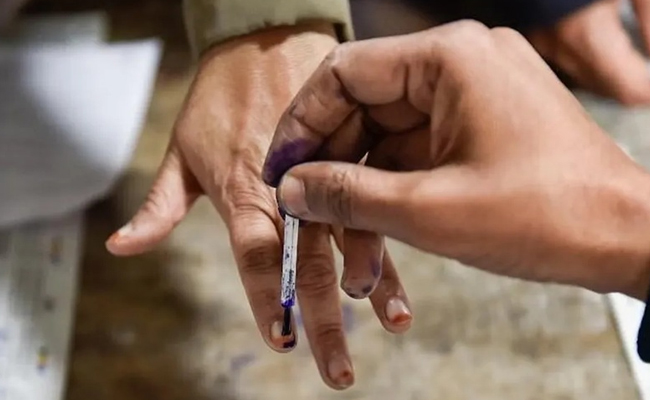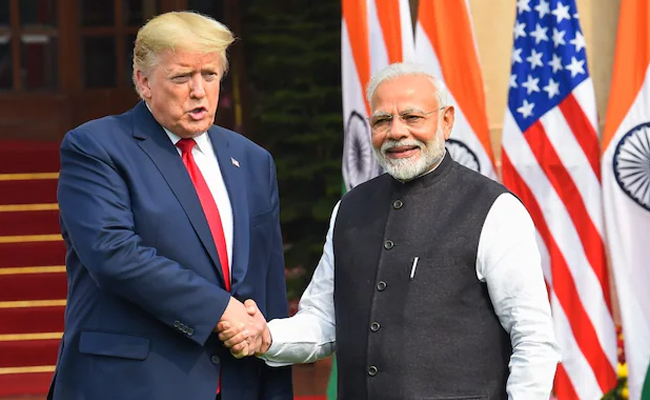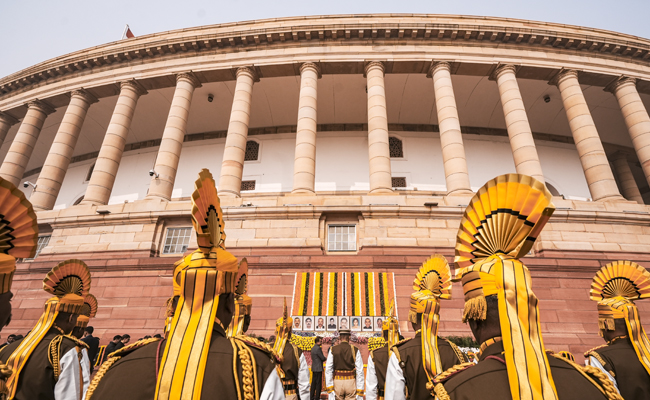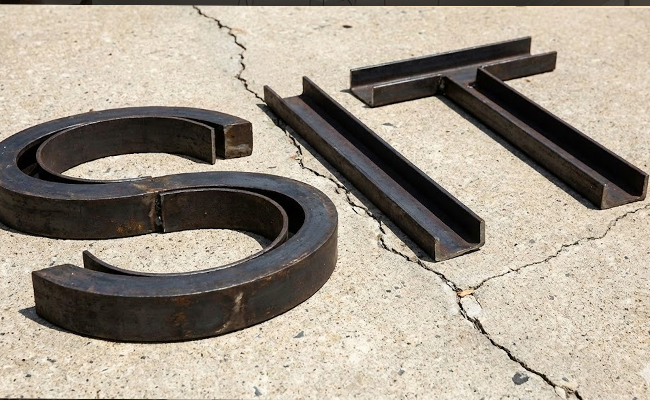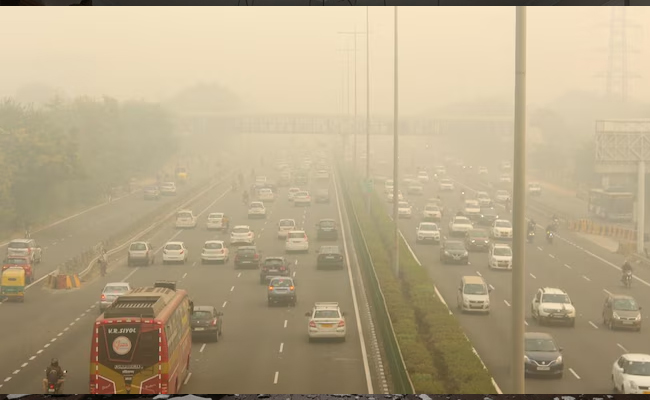New Delhi (PTI): The government is likely to bring three bills, including two to amend the Constitution, to put in place its plan to hold simultaneous elections.
One of the proposed Constitution amendment bills, that deals with aligning the local bodies elections to that of the Lok Sabha and the Assemblies, will require an endorsement from at least 50 per cent of the states.
Moving ahead with its 'one nation, one election' plan, the government earlier this month accepted the recommendations of the high-level committee for holding simultaneous polls for the Lok Sabha, state assemblies and local bodies in a phased manner after a countrywide consensus-building exercise.
The proposed first constitutional amendment bill would deal with making provisions for holding Lok Sabha and state legislative assembly elections together.
Citing recommendations of the high-level committee, sources said the proposed bill would seek to amend Article 82A by adding sub-clause (1) relating to the 'appointed date'. It will also seek to insert sub-clause (2) to Article 82A relating to the end of terms of the Lok Sabha and state legislative assemblies together.
It also proposes to amend Article 83(2) and insert new sub-clauses (3) and (4) relating to the duration and dissolution of the Lok Sabha. It also has provisions related to the dissolution of the legislative assemblies and amending Article 327 to insert the term "simultaneous elections".
This bill will not require ratification by at least 50 per cent of the states, the recommendation said.
The proposed second Constitutional amendment bill will require ratification by at least 50 per cent of the state assemblies as it will deal with matters relating to state affairs.
It will seek to amend constitutional provisions relating to the preparation of electoral rolls by the Election Commission (EC) in consultation with State Election Commissions (SECs) for elections to local bodies.
Constitutionally, the EC and SECs are separate bodies. The EC holds elections to the post of the President, the Vice President, Lok Sabha, Rajya Sabha, state assemblies and state legislative councils while the SECs are mandated to conduct polls to local bodies such as municipalities and panchayats.
The proposed second Constitution amendment bill will also create provisions to hold simultaneous elections to municipalities and panchayats, along with elections to Lok Sabha and state legislative assemblies by inserting a new Article 324A.
The third bill will be an ordinary one to amend provisions in three laws dealing with Union territories having legislative assemblies -- Puducherry, Delhi and Jammu and Kashmir -- to align the terms of these Houses with other legislative assemblies and the Lok Sabha as proposed in the first constitutional amendment bill.
The statutes it proposes to amend are the Government of National Capital Territory of Delhi Act-1991, the Government of Union Territories Act-1963 and the Jammu and Kashmir Reorganisation Act-2019.
The proposed bill will be an ordinary legislation not requiring a change in the Constitution and will also not need ratification by the states.
The high-level committee had proposed amendments to three Articles, insertion of 12 new sub-clauses in the existing articles and tweaking three laws related to Union Territories having legislative assemblies. The total number of amendments and new insertions stands at 18.
In its report submitted to the government in March, just before the general election was announced, the panel recommended implementing "one nation, one election" in two phases.
It suggested simultaneous polls for the Lok Sabha and state assemblies in the first phase and elections for local bodies like panchayats and municipal bodies within 100 days of the general election in the second phase.
It also recommended a common electoral roll, which would need coordination between the Election Commission and State Election Commissions.
Let the Truth be known. If you read VB and like VB, please be a VB Supporter and Help us deliver the Truth to one and all.
New Delh (PTI) The Congress on Saturday said it is perhaps not very surprising that India is not part of a US-led strategic initiative to build a secure silicon supply chain, given the "sharp downturn" in the Trump-Modi ties, and asserted that it would have been to "our advantage if we had been part of this group".
Congress general secretary in charge of communications Jairam Ramesh took a swipe at Prime Minister Narendra Modi, saying the news of India not being part of the group comes after the PM had enthusiastically posted on social media about a telephone call with his "once-upon-a-time good friend and a recipient of many hugs in Ahmedabad, Houston, and Washington DC".
In a lengthy post on X, Ramesh said, "According to some news reports, the US has excluded India from a nine-nation initiative it has launched to reduce Chinese control on high-tech supply chains. The agreement is called Pax Silica, clearly as a counter to Pax Sinica. The nations included (for the moment at least) are the US, Japan, the Republic of Korea, Singapore, the Netherlands, the United Kingdom, Israel, the United Arab Emirates, and Australia."
"Given the sharp downturn in the Trump-Modi ties since May 10th, 2025, it is perhaps not very surprising that India has not been included. Undoubtedly, it would have been to our advantage if we had been part of this group."
"This news comes a day after the PM had enthusiastically posted on his telephone call with his once-upon-a-time good friend and a recipient of many hugs in Ahmedabad, Houston, and Washington DC," the Congress leader asserted.
The new US-led strategic initiative, rooted in deep cooperation with trusted allies, has been launched to build a secure and innovation-driven silicon supply chain.
According to the US State Department, the initiative called 'Pax Silica' aims to reduce coercive dependencies, protect the materials and capabilities foundational to artificial intelligence (AI), and ensure aligned nations can develop and deploy transformative technologies at scale.
The initiative includes Japan, South Korea, Singapore, the Netherlands, the United Kingdom, Israel, the United Arab Emirates, and Australia. With the exception of India, all other QUAD countries -- Japan, Australia and the US -- are part of the new initiative.
New Delhi will host the India-AI Impact Summit 2026 on February 19-20, focusing on the principles of 'People, Planet, and Progress'. The summit, announced by Prime Minister Narendra Modi at the France AI Action Summit, will be the first-ever global AI summit hosted in the Global South.
Prime Minister Modi and US President Trump on Thursday discussed ways to sustain momentum in the bilateral economic partnership in a phone conversation amid signs of the two sides inching closer to firming up a much-awaited trade deal.
The phone call between the two leaders came on a day Indian and American negotiators concluded two-day talks on the proposed bilateral trade agreement that is expected to provide relief to India from the Trump administration's whopping 50 per cent tariffs on Indian goods.
In a social media post, Modi had described the conversation as "warm and engaging".
"We reviewed the progress in our bilateral relations and discussed regional and international developments. India and the US will continue to work together for global peace, stability and prosperity," Modi had said without making any reference to trade ties.

